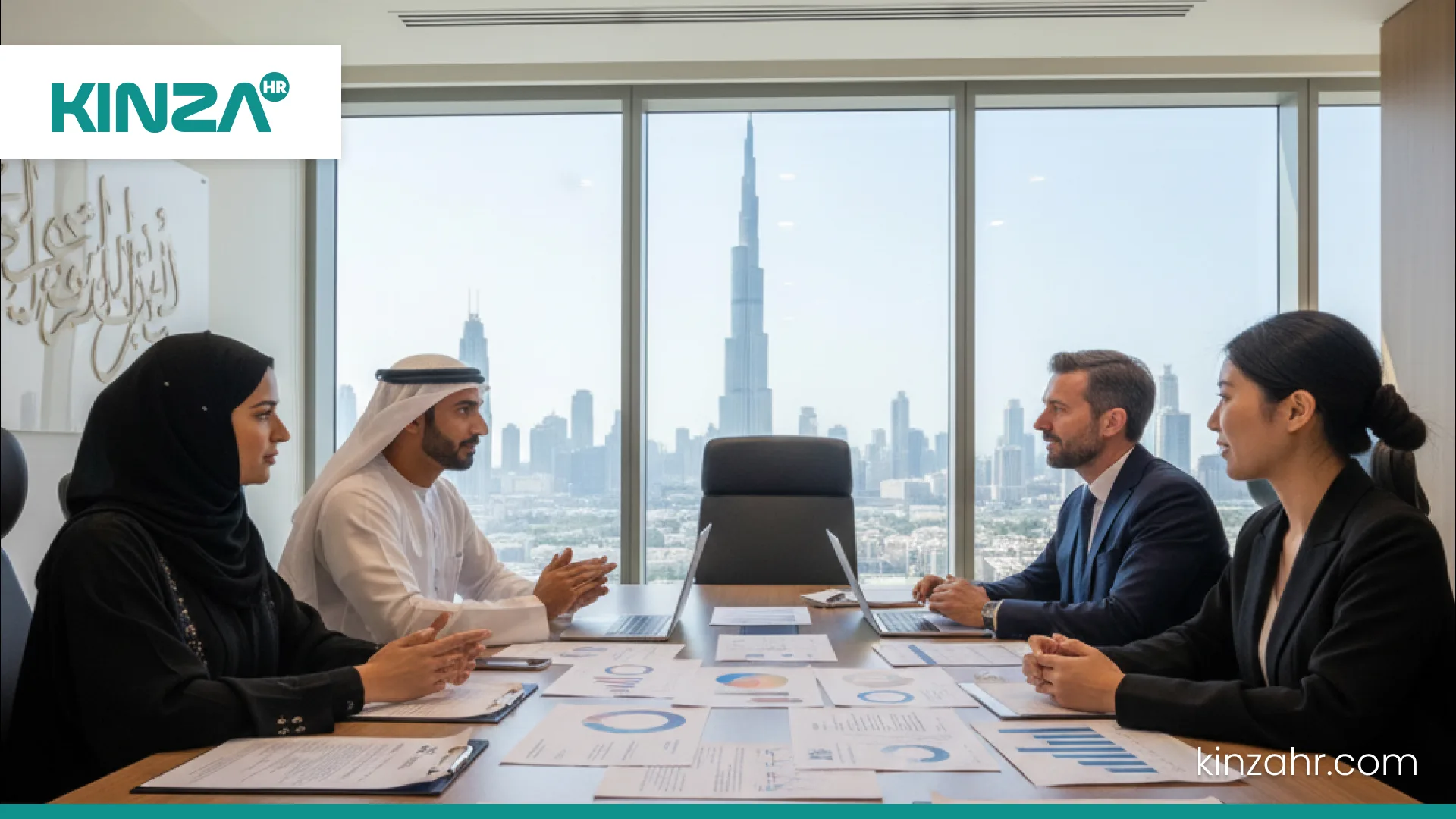The emiratisation initiative, a policy, designed to empower UAE nationals. The program ensures their active participation in the workforce. The aim is to reduce dependency on foreign labor. While creating diverse employment opportunities for Emiratis. In turn, it will help strengthen the economy.
The UAE government has implemented various strategies. The purpose behind this is to promote Emiratisation. This way fosters the future economic sustainability of the nation.
The article explores the:
- Key objectives
- Sectors prioritised for Emiratisation
- The challenges involved, and
- Advantages for everyone.
What is Emiratisation in UAE and Why is it Important?
A strategic initiative, Emiratization is UAE is introduced by the government. The introduction of the program is achieving reduced unemployment among Emirati citizens. At the same time, fostering a dynamic and diverse economy. The policy focuses on increasing local participation in various industries by:
- Offering more job opportunities
- Promoting education, and
- Improving the life quality for UAE nationals.
Emiratization can enhance the Emirati’s role in the workforce. They achieve this through these efforts. Ultimately, it drives the nation’s overall economic progress.
The initiative also seeks to empower men and women. It breaks down traditional barriers and encourages social stability. Emiratization supports cultural growth as Emiratis play a crucial role in the nation’s development. As a result, their role strengthens national identity. Emiratization’s significance is to create a prosperous future for UAE citizens. A way to the nation’s continued success and global prominence.
Key Objectives of Emiratisation Policies
Emiratisation in the UAE is centered around several core objectives:
Reducing Unemployment:
The policy reduces unemployment rates among nationals. This can be achieved by increasing the Emirati’s number in the workforce
Economic Diversification:
Emiratisation encourages Emiratis to work across various industries. Greatly diversifies the economy and reduces dependence on oil revenues.
Skill Development:
The policy promotes local talent by investing in education and training programs. These must align with market needs.
Sustaining National Identity:
The UAE preserves its cultural and national identity. They do so ensuring a larger Emirati presence in the workforce.
Encouraging Gender Equality:
Emiratisation works towards breaking gender barriers. Equal opportunities promotion for men and women in the workplace.
Sectors Prioritised for Emiratisation in the UAE

The UAE government has identified several key sectors. Specifically where Emiratisation efforts are being intensified:
Government and Public Sector:
A strong focus on increasing the Emirati’s number of government jobs. It ranges from administrative positions to leadership roles.
Banking and Finance:
The finance sector is very prominent. The sector plays a crucial role in the UAE’s economy. In this regard, Emiratisation is essential to local participation in this industry.
Healthcare:
The UAE is focused on several sectors. Training and employing Emiratis in the healthcare sector is on top. Due to an increasing need for skilled healthcare professionals
Telecommunications and IT:
Emiratisation in IT and telecommunications is key. This creates a competitive edge in the tech space, as digital transformation becomes increasingly vital.
Engineering and Construction:
A focus on hiring Emirati engineers and technicians for construction projects. Given the UAE’s booming infrastructure development.
Challenges Faced by Companies in Implementing Emiratisation in UAE
Undoubtedly, Emiratisation has brought numerous benefits. Still, businesses face challenges in fully implementing the policy:
Skills Gap:
Many Emiratis are not equipped with the technical skills required for certain industries. This creates a challenge for businesses in hiring suitable candidates.
Cultural and Workplace Adjustments:
Some companies may face difficulties in integrating Emiratis into work environments. Especially those that have traditionally been staffed by expatriates.
Limited Experience:
Emirati job seekers often have less work experience compared to foreign candidates. It requires businesses to invest in training programs.
High Wage Expectations:
Some Emirati candidates expect higher salaries compared to their expatriate counterparts. Discouraging employers from hiring locally.
Benefits of Emiratisation for Employers and Job Seekers
The Emiratisation initiative offers numerous benefits. These are advantageous for both employers and Emirati job seekers:
For Employers:
- Incentives and Support: The UAE government offers financial incentives. These may include subsidies and grants. They are provided to businesses that meet Emiratisation quotas.
- Improved Corporate Image: Actively participating companies in Emiratisation are viewed as more socially responsible. Viewing as they are largely contributing to the national economy.
- Access to Talent: Businesses gain access to a growing pool of skilled professionals. As more Emiratis are trained and educated.
For Job Seekers:
- Increased Employment Opportunities: For Emiratis, the policy ensures more job openings. These are particularly in high-demand sectors.
- Training and Development: Emiratis benefit from extensive government programs. These initiatives equip them with the skills necessary for various professions.
- Job Security: Emiratis often enjoy better job stability and career growth prospects. This is due to the emphasis on local talent in the workplace.
How Businesses Can Effectively Adopt Emiratisation Strategies
To successfully adopt Emiratisation strategies, businesses can take several proactive steps:
Invest in Training:
Provide comprehensive training programs. These programs help Emirati employees develop the necessary skills. So, that they can excel in the workplace.
Offer Competitive Salaries:
Businesses should offer competitive compensation packages to attract top local talent. Those packages must align with industry standards.
Promote an Inclusive Work Culture:
Emiratisation in the UAE encourages diversity in the workplace. As it greatly fosters an environment while creating a space where expatriates and Emiratis work collaboratively.
Collaborate with Government Programs:
Partner with government agencies that offer Emiratisation support. This streamlines recruitment and meets regulatory requirements.
Focus on Long-Term Career Development:
Implement mentorship programs and career development opportunities. It supports Emirati’s growth within the organization.
Conclusion
In conclusion, Emiratisation in the UAE is a critical policy. It plays an integral role in shaping the future of employment. The initiative supports the goals by focusing on local talent. This reduces dependency on expatriates and offers more opportunities for Emiratis. The goals can be the nation’s long-term economic and social goals.
Despite its challenges, the benefits for employers and job seekers make Emiratisation a key driver. Especially of the UAE’s growth and sustainability. Businesses can effectively implement Emiratisation strategies. This can be achieved through careful planning and collaboration with the government. As a result, it ensures a brighter future for their workforce and the nation.
FAQs
1. What is the Emiratisation policy in the UAE?
Emiratization is the UAE government’s initiative. The program aimed at:
- Promoting local talent in key sectors.
- Increasing the number of Emiratis
- Reducing unemployment
2. Which sectors are focused on for Emiratisation?
Key sectors include:
- Government services
- Banking
- Healthcare
- Telecommunications
- IT,
- Engineering.
3. What challenges do companies face when implementing Emiratisation?
Companies face challenges such as skills gaps, cultural adjustments, limited experience among Emiratis, and wage expectations.
4. How can businesses adopt Emiratisation strategies?
Businesses can invest in training programs. They offer competitive salaries while fostering an inclusive work culture. Additionally, they collaborate with government initiatives and focus on long-term career development.







